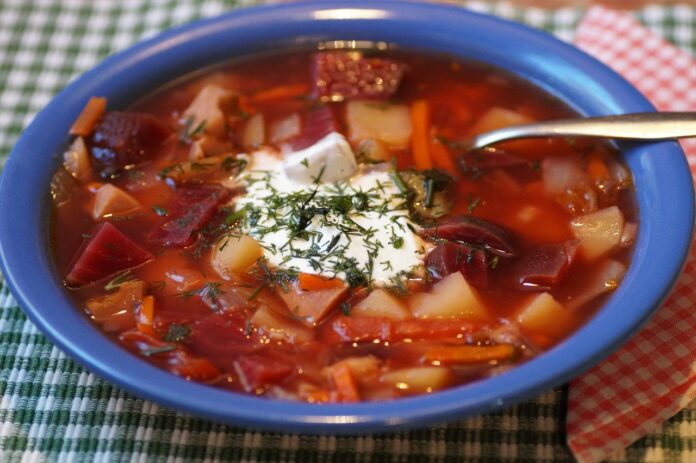Borscht, by definition, is a beet-based soup or a stew made from sauerkraut. But can such a description capture the full flavor of this traditional Slavic dish? Certainly not! Every cook prepares it in their own way, slightly altering the classic recipe, perhaps experimenting with spices or adding unique ingredients.
It’s not enough to just throw potatoes, carrots, peppers, and other components into a pot of broth. To make delicious borscht, one must approach the cooking process with a good mood – as the saying goes.
Interesting Facts About Borscht:
- The name of the dish comes from a now-forgotten ingredient – a plant called hogweed. Only its young leaves were used in cooking, giving the stew a unique taste and aroma. This is not the weed that causes problems for gardeners today, but its cultivated variety.
- The earliest recipe for borscht that has reached us comes from 17th-century manuscripts. It recommended using whey or green apples to add acidity to the broth. Since then, the composition of the dish has changed multiple times, but beet soup has retained its leading position in the popular ranking to this day.
- Slavs long resisted using tomatoes and potatoes in their recipes, viewing them with suspicion. These crops were not grown in Russia for a long time, so they were considered dubious and unsuitable for frequent consumption.
- Peasants would cook borscht in huge quantities and serve it as breakfast, lunch, and dinner for several days in a row. Due to the lack of variety in their diet, this food became very monotonous. This gave rise to the term “overdo it” (перебарщивать).
- Beet soup was a favorite dish of Empress Catherine II and Nikolai Vasilyevich Gogol.
- In one of Russia’s research institutes, the dish was adapted for astronauts. Now, the colorful taste of borscht, packed into special tubes, is enjoyed by staff on orbital stations. It is said that such a meal in zero gravity is especially popular.
- The ingredients of a Tibetan elixir that drives away sadness closely resemble a borscht recipe.
- People who regularly have borscht in their diet suffer less from high blood pressure. This is due to the beneficial substances that leach into the broth from the vegetables during cooking and are well absorbed by the body.
In September, many regions in Ukraine and Belarus traditionally hold Borscht Festivals. Experienced chefs conduct cooking masterclasses and prepare borscht in a giant pot over an open fire, offering it to all who come.
